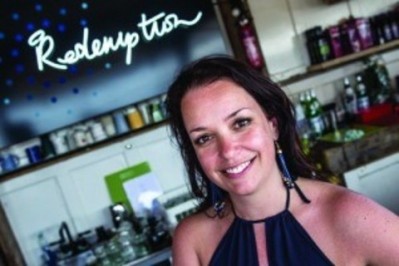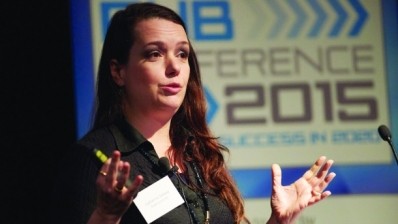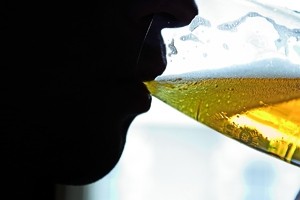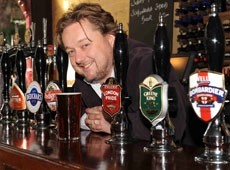The Big Interview: Catherine Salway, Redemption Bar
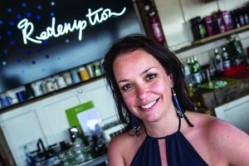
They’re so hard in this part of west London they’ve completely ignored the ‘no litter’ sign on the knife amnesty bin and stuffed it full of rubbish. Yet this is where you’ll find Redemption.
Redemption the bar, that is, round the corner in Golborne Road, hunkered in the concrete base of Trellick Tower, Ernö Goldfinger’s masterpiece of Brutalist architecture and block of flats. That Redemption is attracting hipsters from across London to this poor neighbour of Notting Hill seems even more unlikely when you realise you can’t get an alcoholic drink here.
Redemption is the creation of Catherine Salway, who last year gave up a prestigious role looking after the corporate identity of one of the world’s most famous companies to open a bar.
It is, of course, no ordinary bar. It isn’t even an ordinary ‘dry bar’. There’s much more to Redemption than what it doesn’t sell.
Brand
The food is vegetarian and mostly raw, the dishes made by hand from responsibly-sourced ingredients: salads and curries; sharing platters and snacks; and desserts such as raw chocolate mousse and plantain pancakes.
The drinks are ‘mocktails’ and use many of the same ingredients to help the business meet its zero-waste commitment.
The Coco-Rita replicates the zip of a Margarita but without the alcohol, while the Beet-o-tini is made with coconut water, agave and freshly pressed beetroot juice.
There’s a lot of beetroot going on here, but don’t get the wrong idea. In Redemption Salway is deploying all she learned at Virgin to catch a consumer mood — and she’s having fun doing it.
“Like some people have a book in them, I knew I had a brand in me,” she says. “I wanted it to be something that would make people’s lives better, enable them to have a good time without getting a sore head. Somewhere you can spoil yourself without spoiling yourself.
“There’s a gap in the market for that, and I knew I could create a brand that’s sexy and cool. I thought I could be a good citizen and I might ultimately earn some money out of it.”
Preachy
She trialled the concept as a pop-up on a rooftop in Hackney, east London, last summer and in September moved into the Golborne Road site, which Redemption shares with the community furniture upcycling operation Goldfinger Factory.
Rent-free — as the council sees the project as helping regenerate the area — it has what Salway calls “a Shoreditch feel”, a roughly-hewn kind of space with details that lift it into the realm
of cool.
The beefy sound system plays soul, R&B and Ibiza in the daytime and the neon sign above the bar was made at Tracey Emin’s studios.
Borrowing from software development jargon, Salway describes the bar as a ‘beta-phase’ site “where you put a brand out there before it’s perfect, to test it and prove there’s a profit in it — and a consumer demand”.
She adds: “We’re getting a name. People drive here from all over London. We know our consumers: educated hipster types, 60% female. A lot come here straight from the gym because it’s supposed to be the best kind of food to eat after a workout. A lot of it is raw — our spaghetti is made from raw courgette, for instance — it retains all the nutrients. But it isn’t preachy, it’s fun.
“Because we’re able to buy in a variety of ingredients, and our consultant chef, Jayne Totty, is a raw food specialist, we can create amazing, luxurious dishes with varied textures and flavours that are hard to make at home — unless you’re Gwyneth Paltrow.”
Lifestyle choice
Salway insists people will always want somewhere to meet face-to-face but “that doesn’t always have to happen around alcohol”.
She says: “There are coffee shops, but nobody talks to anyone else in those places. You could ask who’d be mad enough to try something like this. You’ve got to be brave enough to try something crazy, and in any case I don’t want the bigger players copying me. But educated consumers want healthier things.
“I’m surprised how many are opting out of alcohol as a lifestyle choice, or because it’s a cool thing to do. People cutting down on drinking find it hard when they go to a pub. When you’re in a licensed place the bar always calls you. But there’s no dynamic of alcohol here.
“It’s not everyone’s cup of tea all the time. It won’t be the first choice for the average Brit. But there’s a role for it in the rich tapestry of the leisure scene. We can do five to 10 in the UK, with perhaps three of them in London, then there’s a big opportunity in the US and Australia.”
Ethics
Salway is keen to capitalise on the momentum and has funds available from angel investors to open her next Redemption. And as PMA went to press, Salway revealed that she’d ‘shaken’ on a deal for a site in Shoreditch. She’d also like to install the concept in a closed pub, and she’s open to invitations to run the food operation in an existing pub.
She says: “Pubs could appeal more to people who want healthier choices. The public are changing all the time, learning about healthy options, and if you don’t get that you get left behind.
“It does depend on the age group, though. Men over 50 don’t see it at all. This is about young people, it’s newsworthy, it creates a buzz.”
It’s Redemption policy, too, to employ people recovering from drugs and alcohol addiction. “It’s perfect for people who want that first job back — we have nine staff, and three-quarters
of them are in recovery.”
In blending ethics with a sharp commercial instinct, Salway is far from moralistic. She still drinks herself, “once or twice a week”. “I love a glass of wine, I like the taste. Perhaps I like it too much. I’m in a demographic of women who are the same, I think. Pubs like All Bar One made wine accessible, which was good, but the drinking crept up on us.
“Nineties London was really boozy, it was the norm to drink when you socialised and to drink heavily. When you went out it was quite often an exercise in trashing your body.
“Redemption is a good night out that can do you no harm, it’s got a great vibe, it’s a cool and sexy venue where nothing bad can happen.
“I’m eating here half the week too and it changes your palate,” she adds. “Pub and restaurant food seems too fatty to me now. And I’ve lost two stone. I don’t intend to be evangelical, but it really is good for you.”
Key dates
1994
Catherine Salway graduates from Sheffield University with a degree in economics.
1995
After stints with Channel 4 and Marvel Comics she joins Virgin Drinks Company as PR manager.
1999
Becomes brand manager for Virgin Cola.
2000
Moves to Sydney as head of brand communications, Australia.
2001
Returns to London as brand planning manager for Virgin Mobile.
2002
A new role is created for Salway to manage the Virgin brand across the group.
2006
She is appointed group brand director.
2007
Salway joins Virgin Enterprises’ board and launches charity Virgin Unite.
2008
She takes charge of Virgin Insight, responsible for identifying new opportunities for the company.
2009
She leads virgin.com, looking after online activity including Richard Branson’s blog, Facebook and Twitter.
2010
Salway is voted among the UK’s top 100 marketers by Marketing magazine, and again in 2011.
2013
She opens the first Redemption bar in Hackney, east London, followed by the current permanent outlet in west London.
